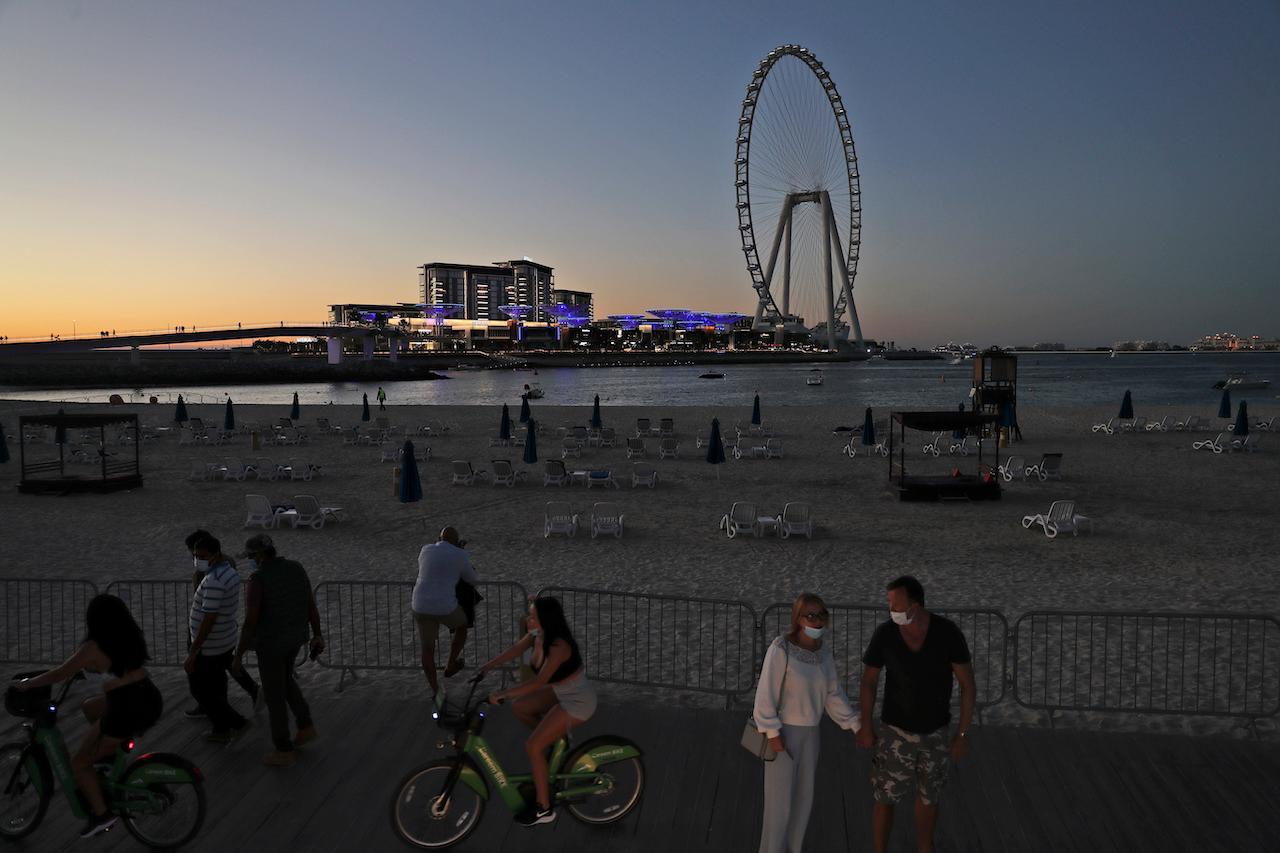Reality catching up with Dubai’s dreams as Covid-19 rampages among skyscrapers
Dubai’s ruling sheikh has declared that widespread vaccination, not movement controls, will 'accelerate the full recovery of our country'.
Since becoming one of the world’s first destinations to reopen for tourism, Dubai, the liveliest city in the United Arab Emirates, has promoted itself as the ideal pandemic vacation spot.
It cannot afford to do otherwise, analysts say, as the virus is shaking the foundations of the city-state’s economy as it runs amok with increasing vigour.
With peak tourism season in full swing, coronavirus infections are surging to unprecedented heights. Daily case counts have nearly tripled in the past month.
But in the face of a growing economic crisis, the city still won’t lock down, reports the AP.
“Dubai’s economy is a house of cards,” said Matthew Page, of the Carnegie Endowment for International Peace. “Its competitive advantage comes from being a place where rules don’t apply.”
While most countries banned UK tourists over fears of the fast-spreading virus variant there, Dubai, home to some 240,000 British expats, kept its doors open for them over Christmas.
Dubai’s airline Emirates flew five daily flights from London and within days, the new virus strain had arrived.
But that didn’t stop celebrities from fleeing Britain’s freezing lockdown for Dubai’s bars and beaches, with no coronavirus test needed before boarding.
The London-Dubai air route ranked busiest in the world over the first week of January, said OAG, an aviation data analysis firm.
“People have had enough of this pandemic already,” said Iris Sabellano from Dubai’s Al Arabi Travel Agency.
She told the AP that many of her clients have been forced to quarantine after testing positive for the virus on arrival.
Others are determined to enjoy the sun. “With vaccines coming out, they feel it’s not the end of the world, they’re not going to die,” she said.
For those who do die of Covid-19, long-haul airline Emirates offers to pay US$1,800 to help cover funeral costs.
But tourism is falling off as thousands, unnerved by the numbers, head home.
Israeli tourists, who were coming in their tens of thousands following a normalisation deal, have vanished due to new quarantine rules. Visa waivers for Israelis were suspended on Monday.
Britain’s announcement of a 10-day quarantine for those returning from Dubai has already hit arrivals from the UK.
“Brits make up such a huge proportion of tourists and investors in Dubai,” said David Tarsh, spokesman for ForwardKeys, a travel data-analysis company. “Cutting that pipeline is a complete disaster for the city.”
British Transport Secretary Grant Shapps tweeted that the government’s decision was prompted by the UAE’s latest virus data. Beyond daily infections, however, the data is scant. The UAE does not make public information about disease clusters or hospitalisations.
The only numbers available are more than 256,000 confirmed cases and 751 deaths.
Bloomberg reports that the Dubai Media Office issued a statement saying the emirate “continues to maintain the highest levels of protection against the pandemic and compliance with preventive measures.”
Analysts speculate the UAE’s unique demographics – 90% foreigners, comprising mostly healthy, young labourers – have prevented well-staffed hospitals from becoming overwhelmed and kept the death rate low.
But Abu Dhabi, Dubai’s more conservative neighbour and the UAE capital is demanding anyone crossing into Abu Dhabi must present a negative coronavirus test.
Relations between service-heavy Dubai and oil-rich Abu Dhabi can get tense. During the 2009 financial crisis, Abu Dhabi had to rescue Dubai with a US$20 billion bailout. This time, it’s unclear whether Dubai can count on another cash infusion, given the crash in global oil prices.
Under pressure, authorities have seized on vaccines as the only way to contain the outbreak.
Front pages of state-linked newspapers are running stories touting the mass inoculation drive, which officials claim to be the world’s second-fastest after Israel, with 19 doses distributed for every 100 people as of Tuesday.
The UAE is offering the Chinese coronavirus vaccine Sinopharm to everyone as demand has overwhelmed supply for the Pfizer-BioNTech vaccine. Dubai hotline operators say thousands of high-risk residents remain on the waiting list.
With the country shattering its infection record for seven consecutive days, Dubai’s ruler, Sheikh Mohammed bin Rashid Al Maktoum, declared that widespread vaccination, not movement restrictions, would “accelerate the full recovery of our country.”
But even if Dubai meets its goal of inoculating 70% of the population by the end of 2021, Moody’s Investors Service predicts the UAE’s economy to take three years to bounce back.
Subscribe to our newsletter
To be updated with all the latest news and analyses daily.
